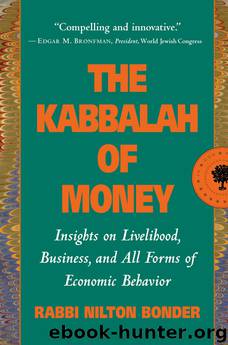The Kabbalah of Money by Adriana Kac

Author:Adriana Kac
Language: eng
Format: mobi, epub
Publisher: Shambhala Publications
Published: 0101-01-01T00:00:00+00:00
Learning from the Thief
Let’s return to the scene where we have our hand in our pocket and there’s a beggar at our car window. What are our interests in this interaction? We want to do what’s right and just in order to avoid losses in larger cycles of return. We want to honor and safeguard who we are at that moment by avoiding false morals or ideals. We don’t want to leave our heart entangled in this situation—we want to experience it whole, and get it over and done with. We want to be true to what we see and to how far we see. But the pocket is dark, and we’re dealing with evil impulses.
Evil impulses are all around us and are essential elements in shaping our lives. Jewish tradition says that if it weren’t for the evil impulse (yetzer ha-ra), we would all starve and no children would be conceived. The evil impulse is the raw material with which we build our self-knowledge. It reveals our intimate behavior, which we disguise not only to the outside world but also to ourselves. When talking about the Market and dealing with the pocket, we use the thief to symbolize our evil impulse. The thief’s inclinaton is towards stealing things from people. He can steal from a beggar, the Market, or from himself. But if there has been theft, in the medium and long term, everyone will have been robbed.
There are essentially two dangerous evil impulses: one that pushes us to find excuses for our behavior (like the fool) and one that drives us to run away from situations (like the nothing). About the first impulse, Rabbi Shmelke tells us:
“Don’t try to find fault in a poor person who asks you for help as an excuse for not helping him. Don’t look for his faults, saying, ‘Such a strong man . . . couldn’t he work?’—because if you do. God will look for faults in you also and will certainly find many of them. Remember that the mistakes of the person who is begging for your help have already been paid for through his misery, while yours are still with you.”
To help or not to help, that is still an unresolved question. But excuses are false paths that contribute to the poverty and to the losses of the Market.
As to the second evil impulse—running away or giving in—we learn from the Berdichever Rabbi, who learned from a thief:
The Rabbi of Berdichev traveled from city to city raising funds for poor people, but he was only meagerly successful. Regretting the time he had wasted, he decided not to get involved with this kind of venture in the future. When he returned home, he saw that a policeman was flogging a thief who had been caught red-handed. The rabbi paid the thief’s bail, and when they set him free, he asked the thief if he had learned his lesson and would thenceforth never steal again. The thief answered immediately: “So what if I was flogged? This time I was unlucky, but next time things will be different.
Download
This site does not store any files on its server. We only index and link to content provided by other sites. Please contact the content providers to delete copyright contents if any and email us, we'll remove relevant links or contents immediately.
| Haggadah | Hasidism |
| History | Holidays |
| Jewish Life | Kabbalah & Mysticism |
| Law | Movements |
| Prayerbooks | Sacred Writings |
| Sermons | Theology |
| Women & Judaism |
The Power of Habit by Charles Duhigg(3141)
Man's Search for Meaning by Viktor E. Frankl(2675)
Mckeown, Greg - Essentialism: The Disciplined Pursuit of Less by Mckeown Greg(2444)
MOSES THE EGYPTIAN by Jan Assmann(2418)
Devil, The by Almond Philip C(2334)
The Complete Dead Sea Scrolls in English (7th Edition) (Penguin Classics) by Geza Vermes(2284)
Unbound by Arlene Stein(2277)
I Capture the Castle by Dodie Smith(2040)
Schindler's Ark by Thomas Keneally(1890)
The Invisible Wall by Harry Bernstein(1808)
The Gnostic Gospel of St. Thomas by Tau Malachi(1799)
The Bible Doesn't Say That by Dr. Joel M. Hoffman(1682)
The Secret Doctrine of the Kabbalah by Leonora Leet(1612)
Political Theology by Carl Schmitt(1588)
The Jewish State by Theodor Herzl(1537)
A History of the Jews by Max I. Dimont(1533)
The Dead Sea Scrolls Bible by Martin G. Abegg(1520)
The Book of Separation by Tova Mirvis(1493)
Oy!: The Ultimate Book of Jewish Jokes by David Minkoff(1375)
